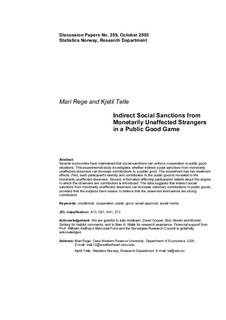| dc.contributor.author | Rege, Mari | |
| dc.contributor.author | Telle, Kjetil | |
| dc.date.accessioned | 2011-11-24T16:03:31Z | |
| dc.date.available | 2011-11-24T16:03:31Z | |
| dc.date.issued | 2003 | |
| dc.identifier.issn | 1892-753x | |
| dc.identifier.uri | http://hdl.handle.net/11250/180553 | |
| dc.description.abstract | Abstract:
Several economists have maintained that social sanctions can enforce cooperation in public good
situations. This experimental study investigates whether indirect social sanctions from monetarily
unaffected observers can increase contributions to a public good. The experiment has two treatment
effects. First, each participant's identity and contribution to the public good is revealed to the
monetarily unaffected observers. Second, information affecting participants’ beliefs about the degree
to which the observers are contributors is introduced. The data suggests that indirect social
sanctions from monetarily unaffected observers can increase voluntary contributions to public goods,
provided that the subjects have reason to believe that the observers themselves are strong
contributors.
Keywords: conditional, cooperation, public good, social approval, social norms | no_NO |
| dc.language.iso | eng | no_NO |
| dc.publisher | Statistics Norway, Research Department | no_NO |
| dc.relation.ispartofseries | Discussion Papers;No. 359 | |
| dc.subject | Social sanctions | no_NO |
| dc.subject | Public goods | no_NO |
| dc.subject | Social norms | no_NO |
| dc.subject | Voluntary contributions | no_NO |
| dc.subject | JEL classification: A13 | no_NO |
| dc.subject | JEL classification: C91 | no_NO |
| dc.subject | JEL classification: H41 | no_NO |
| dc.subject | JEL classification: Z13 | no_NO |
| dc.title | Indirect social sanctions from monetarily unaffected strangers in a public good game | no_NO |
| dc.type | Working paper | no_NO |
| dc.subject.nsi | VDP::Social science: 200::Economics: 210::Economics: 212 | no_NO |
| dc.source.pagenumber | 20 s. | no_NO |
